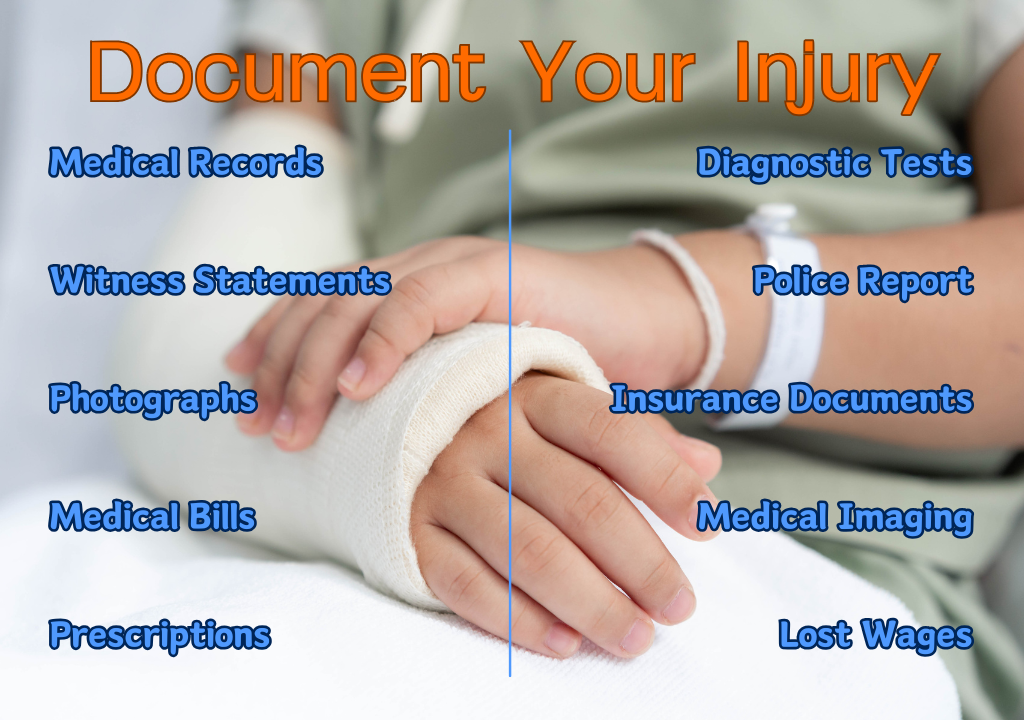Maximize Claims: How to Document Injuries for Personal Injury Cases
Introduction to Injury Documentation
The Importance of Documenting Injuries for Legal Claims
Documenting injuries is your cornerstone for building a solid legal claim in a personal injury case. Thorough documentation serves as undeniable proof of your injuries and fortifies your argument for compensation. It’s the tangible evidence that links the accident to your pain and suffering, forming the foundation of your claim.
Initial Steps to Take After Sustaining Injuries
When you’re injured, acting quickly and thoughtfully can make all the difference. First things first, make sure you’re out of harm’s way and then go straight to a doctor, even if the injury seems mild. It’s not just about healing; it’s about making sure there’s an official record of what happened to you. Equally vital, you’ll want to let the authorities or the management know about the incident. This locks in your account of the events.

Immediately Following the Incident
Ensure Your Safety and Seek Medical Aid
Your safety is paramount. Once you’re in a safe spot, call for medical help. Even if the injuries don’t look serious at first glance, some can be deceitful and worsen with time. A healthcare professional’s prompt attention not only takes care of your well-being but also gets you those essential medical records, should you decide to seek legal action down the road.
Capture the Scene and Immediate Injuries
In the moments after an incident, if it’s safe to do so, use your smartphone to take photos of the accident scene from multiple angles. Capture any environmental factors or hazards that may have played a role. Snap close-ups of your injuries to document their initial severity. These photos serve as unspoken witnesses, locking in the details before memory fades or scenes change.
Building a Robust Records and Documentation File
Keeping Records from Medical Consultations
Make it a priority to save every bit of information from doctors’ visits and medical treatments: notes, orders for tests, test results, and any follow-up instructions. Each paper is a piece of your story, showing the extent of your injuries and the treatments needed. Ask for printouts or digital copies of everything, because they are key to painting a complete picture of your health journey for the courts.

Photographs and Videos as Visual Evidence
Photographs and videos are incredibly compelling in personal injury cases. Make sure your photos are sharp, well-lit, and show different perspectives of your injuries. Videos can capture nuances like mobility issues or pain that still photos can’t. Regularly update this visual diary as evidence of how your injuries are healing—or if they’re not. And importantly, back up these files securely.
Maintaining a Detailed Injury Diary
Documenting Symptom Progression Over Time
As days turn into weeks, your injuries will change—they might get better, or they might not. That’s why you need to keep a running log of how things are developing. Notice a new twinge or a lessening of pain? Write it down. Documenting these changes is a testament to the resilience or the ongoing challenge your body faces post-injury. It’s this kind of detail that paints a clear picture of the long road you’re walking for your recovery.
Recording Pain Levels and Recovery Milestones
Keep a careful note of your pain intensity and frequency. Use a scale from 1 to 10, where 10 is agonizing pain. Also, celebrate and record the recovery wins, no matter how small. These milestones not only show the progress you’re making but may also highlight the effort and time it takes to achieve them. This personal account of struggle and achievement over time adds depth to your case—putting the dry medical facts into human terms.
Organizing Financial and Official Paperwork
Collecting Bills and Receipts Related to the Injury
Gather every single bill and receipt that’s connected to your healing. That’s everything from the big hospital bills down to the small expenses for bandages. These costs tell their own story: the financial burden of getting back on your feet. Keeping them organized helps you—and potentially a court—see the full impact of the injury on your wallet. And remember, you deserve compensation for each cent spent on your recovery.
Attaining a Copy of the Official Accident Report
Having an official accident report is crucial. It’s your proof of what happened, seen through the eyes of law enforcement. As soon as it’s available, request a copy for your records. If you spot mistakes in it, don’t wait—tell the authorities to correct them. Why? Because this document might just show how the other person is at fault, and that could be the turning point for your claim.
Utilizing Witnesses Statements Effectively
How Witness Testimonies Can Strengthen Your Case
Witness statements give your claim a big boost. They’re like extra voices in the courtroom, backing up your side of the story. It’s not just you saying what happened—others saw it too. This can make your case much stronger, especially if their words point to someone else being at fault. It’s evidence that’s hard to ignore and can be the difference between winning and losing in your pursuit of justice.
Steps for Gathering and Preserving Witness Accounts
If anyone saw what happened, ask them if they wouldn’t mind telling what they saw. Get their names and how to reach them, and if they’re okay with it, have them write it all down in detail. This needs to happen sooner rather than later—while the memory is still fresh. Make copies of their statements and keep them safe. This way, if you end up in court, these eyewitnesses can help tell your story and make your case strong.
Seeking Professional Legal Guidance
When to Consult with a Personal Injury Attorney
You might be thinking, “Do I really need a lawyer?” Well, consider getting one if your injuries are serious or if you’re not sure who’s at fault. Or if dealing with the insurance company feels like too much. And if you’re stressed about paying them, know that many don’t ask for money unless they win your case. A good time to chat with an attorney is right after you’ve taken care of your immediate health needs—they can jump in and help with everything that comes next.
The Role of Legal Support in Maximizing Your Claim
With a personal injury attorney by your side, you’re setting yourself up for the best outcome. They know this game better than anyone—they can dig up evidence you didn’t know you needed, get experts to back you up, and stand toe-to-toe with insurance companies that try to lowball you. They’ll guide you through each step, aiming to get every dollar you deserve. Without them, you might miss out on compensation that could really help you heal.
Adjusting Claims Based on Long-Term Impacts
Recognizing When to Update Your Documentation
Stay alert to changes in how you’re feeling, because that calls for an update in your records. If there’s a new pain, a change in treatment, or even an improvement, jot it down. It’s super important to keep your documentation current because it reflects the true scope of your injuries. And if you’re in the middle of a claim, this info can be key in proving the lasting effects of your injury. Remember, your documents are living proof of your recovery journey.
Evaluating the Need for Expert Opinion on Ongoing Issues
Sometimes injuries can be complex, and that’s when an expert’s voice can carry a lot of weight. If you have ongoing problems, consider bringing in a medical expert to explain things. They can talk about what’s wrong, how long it may last, and link it directly to the accident. This adds serious credibility to your claim, especially if the other side tries to question your injuries. An expert’s testimony could very well tip the scales in your favor.
FAQs: Documenting Injuries for Personal Injury Cases
How can photos and videos impact my personal injury claim?
Photos and videos can be powerful in proving your case. They show the severity and impact of your injuries, which words alone can’t do. They make it real for the people deciding on your claim, showing them exactly what happened and how it affected you. Documenting everything right from the start gives you a visual timeline of your recovery, which can be hard to dispute.
What should I do if I did not see a doctor immediately after my accident?
Even if you didn’t see a doctor right away, you can still document your injuries. Take notes on any symptoms, snap photos of your injuries, and track changes over time. This can help prove your case later, even if you didn’t get immediate medical care. Remember, it’s never too late to start documenting.
How soon after an accident should I start documenting injuries?
Start documenting your injuries as soon as you can after an accident. The sooner you begin, the more accurately you’ll capture the details and the less you’ll leave out. Early records are often more credible in personal injury cases, so don’t delay.
What is the best way to document injuries for strengthening my claim?
The best way to document injuries for your claim is multi-faceted: Take immediate photos and videos, see a doctor for medical records, jot down symptoms in a detailed diary, and gather witness statements. Keep all bills and paperwork organized, and update your records as your condition changes. Legal support is also key to ensuring all the proper accident documentation is in place.
All we do is fight for injured victims. And we do not accept defeat.
(512) 996-6369
help@dfoxlaw.com
Address
206 W. Main Street #108, Ste B, Round Rock
TX 78664
